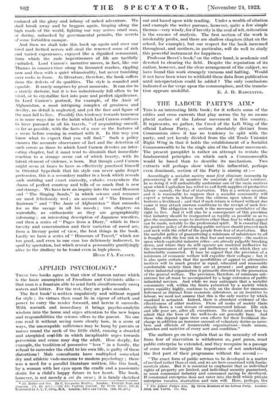THE LABOUR PARTY'S AIM.*
Tins is an interesting little book ; for it reflects some of the eddies and cross currents that play across the by no means placid surface of the Labour movement in this country. It represents, we gather, the Creed of the Left Wing of the official Labour Party, a section absolutely distinct from Communism since it has no tendency to split with the party, and yet keenly divided from the old Trade Unionist Right Wing in that it holds the establishment of a Socialist Commonwealth to be the single aim of the Labour movement. The present pamphlet is rather an attempt to restate the fundamental principles on which such a Commonwealth would be based than to describe its mechanism. Two extracts will perhaps show what this influential, perhaps even dominant, section of the Party is aiming at :- Accordingly a socialist society must first eliminate insecurity by guaranteeing to all its members the essentials of civilized existence. In so doing it will undoubtedly undermine one of the main motives upon which Capitalism has relied to call forth supplies of productive labour—namely, the fear of starvation. This is a serious measure, and it is reasonable to suppose that a socialist community will expect a return in labour from the citizens upon whom it thus bestows a livelihood ; and that if such return is refused without due cause it may attach onerous conditions to the receipt of such live- lihood. The obligation to work is the necessary correlative of the right to live. And it will also be a consequence of this provision that industry should be reorganized as rapidly as possible so as to give the maximum scope to motives other than fear to which appeal can be made, notably to the professional spirit. It is essential that the positive policy of developing public services should proceed neck and neck with the relief of the people from fear of starvation. But the socialist policy of guaranteeing a minimum of subsistence to all is fraught with the less risk in that fear and necessity—the motives upon which capitalist industry relies—are already palpably breaking down, and where they do still operate are rendered ineffective by the circumstances of poverty and inefficiency with which they arc indissolubly connected. It may be argued that the provision of a minimum of economic welfare will expedite their collapse ; but it is also quite certain that the possibilities of appeal to alternative motives will be much greater in equal, educated and reasonably comfortable society than they are at present ; and greater also where industrial organization is primarily directed to the promotion of the general welfare. The provision, therefore, of minimum sub- sistence for all must be accompanied by a large extension of public industzial services. And while we may anticipate that a socialist conununity will, within the limits permitted by a society which prizes equality highly, continue to rely on the desire for eoonomie betterment as distinct from economic subsistence, as an incentive to labour, we need not assume that this is the only motive by which mankind is actuated. Indeed, there is abundant evidence of the effectiveness of other motives. From all ranks of society there already flows a vast stream of unremunerated labour. Idle rich and idle poor are, after all, exceptions. No socialist need fear to admit that the lives of the well-to-do are generally busy. And those who depend upon their own efforts for their livelihood dis- charge in addition an immense amount of voluntary duties as mem- bers and officials of innumerable organizations—trade unions, churches and societies of every sort and condition."
The authors go on to explain that as the necessity of work from fear of starvation is withdrawn so, pari passu, must public enterprise be extended, and they recognize in a passage of some realistic insight the importance of not undertaking the first part of their programme without the second :— " The exact form of public services to be developed is a matter of method rather than of end, and we are here concerned with funda- mentals alone. But it is essential to emphasize that as individual rights of property are limited, and individual security guaranteed, so must communal industry and communal saving be developed. If communal enterprise does not enter into the field which private enterprise vacates, starvation and ruin will. Here, perhaps, lies • The Labour Parlg's dim. Br Seven Members of the Labour Party. Landon:. Allen and Unwln. [is. 6d.1 the chief weakness of present Labour policy: This policy tends to concentrate on one only of the two lines of socialist development. It seeks, by taxation and industrial legislation, to make the position of the owners of capital and employers of labour increasingly unhappy ; and by collective bargaining and legislation to make the position of the worker decreasingly wretched. In this way it will, if carried far enough, eventually stop the capitalist and employer from per- forming their only useful functions, namely, the management and initiation of enterprises and the accumulation of new capital, while the workers will plainly become increasingly unwilling to discharge their functions in the existing condition of industry. We thus approach gradually—in this country very gradually—towards a breakdown of the whole industrial system. The collapse is long delayed because, on the one hand, workers are really much more -ready to work under good conditions or had than a student of Labour or anti-Labour literature might suppose. They are not actuated by purely economic motives, and the improvement in their position is so slow that the mass of them are nowhere in sight of being able to live in luxurious idleness on any kind of dole. On the other band, few things in this world are so much exaggerated as the pbverty and self-depreciation of capitalists. Their ability to bear taxation is immensely greater than they like to pretend ; the check to saving consequent upon fresh taxation is still largely mythical, or at worst temporary. None the less, a point must sonic day be reached at which the amelioration of the workers' position at the expense of property-owners and employers will lead to a breakdown. And the greater the success and the wider the scope of present Labour policy, the sooner will that point be reached. It is evident that Labour is quite well aware of this danger ; it is equally evident that the present method of meeting it is dangerous, and is responsible for the gradual watering down of Labour policy from Socialism to a form of Radicalism, whose only difference from that of professed Liberals is that it keeps five or ten years in advance of this."
The Labour Party is prolific in little handbooks explaining the aim of the movement, and the ordinary reader has perhaps become a little jaded by these reiterated reconstructions of the world in which he lives. But it is really extremely important that people who do not believe in the Socialist remedy should keep abreast of the aims and tenets of the Socialist Party. Otherwise they too often find themselves exposing the fallacy of some proposition which their opponents have abandoned these ten years. This indeed may be effective enough on the platform, but it hardly takes the argument much further. At present the ignorance of the ordinary man about Socialists is only equalled by that of the Socialist about ordinary men.
EVELYN JOHN' STRACffEY.



















































 Previous page
Previous page